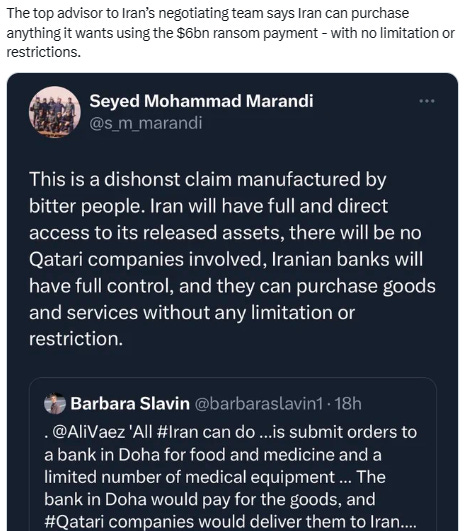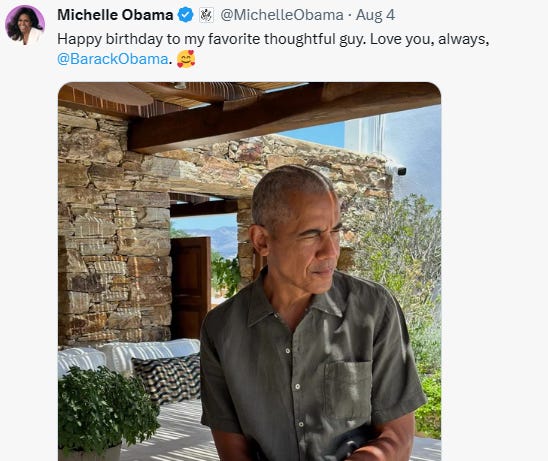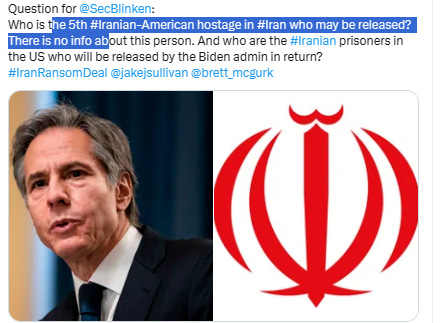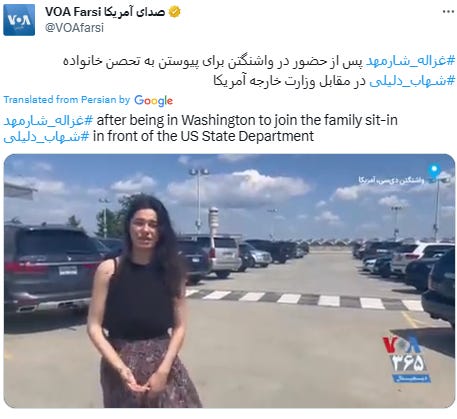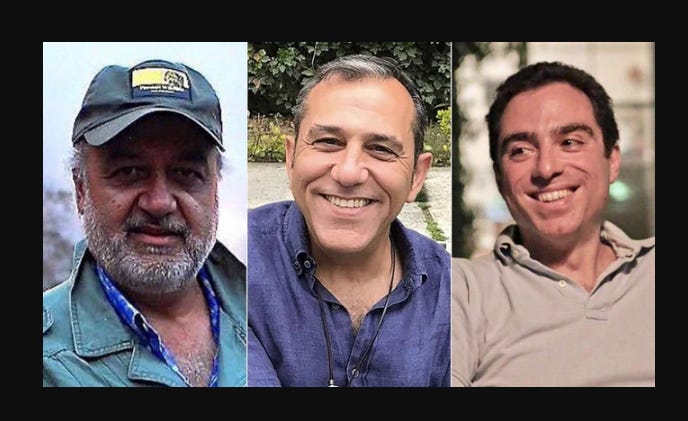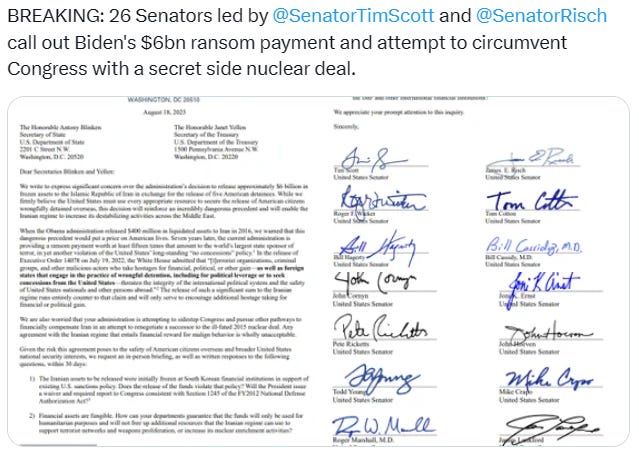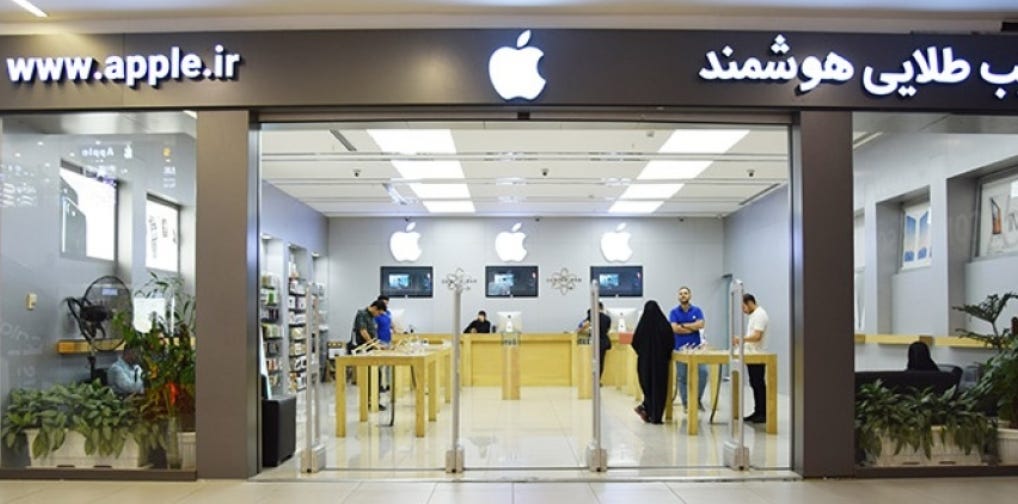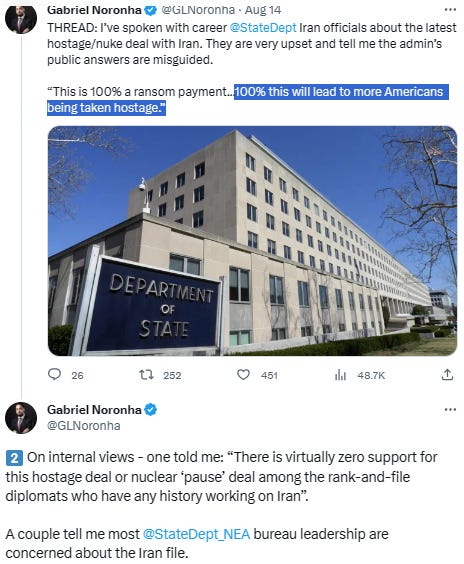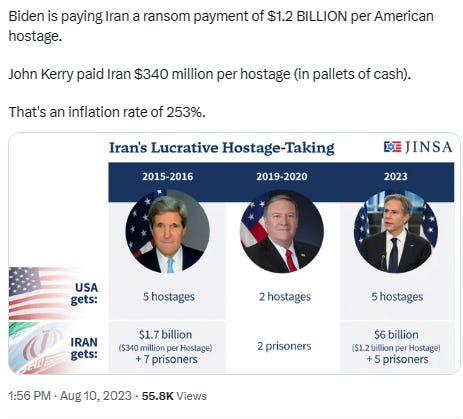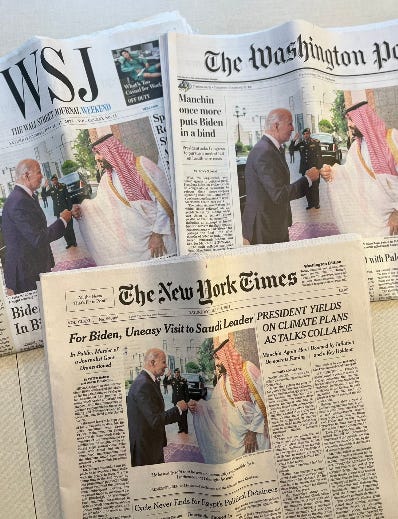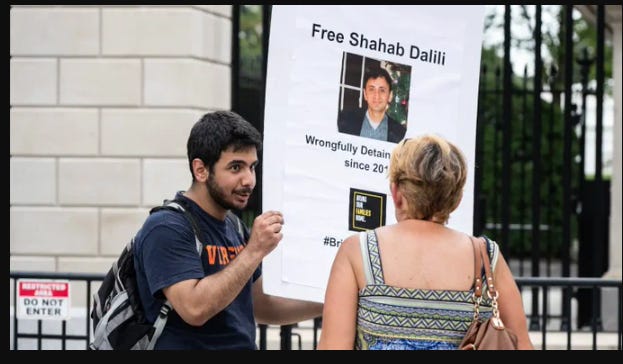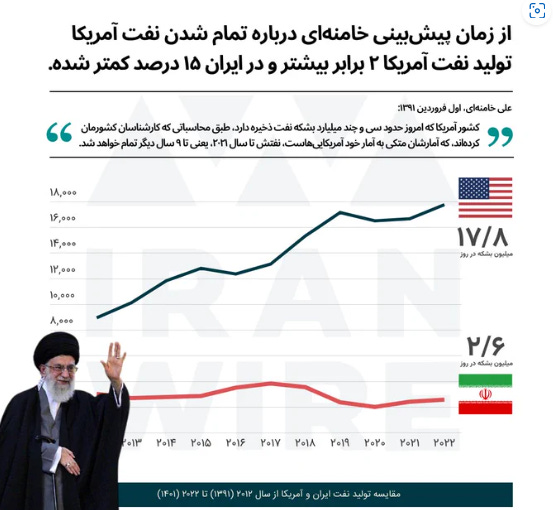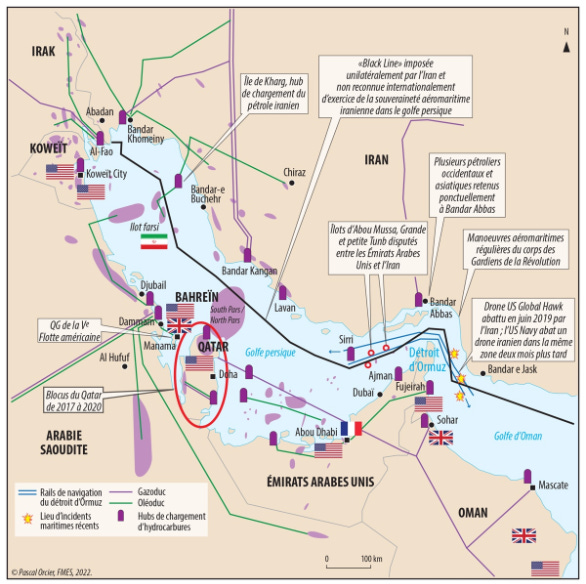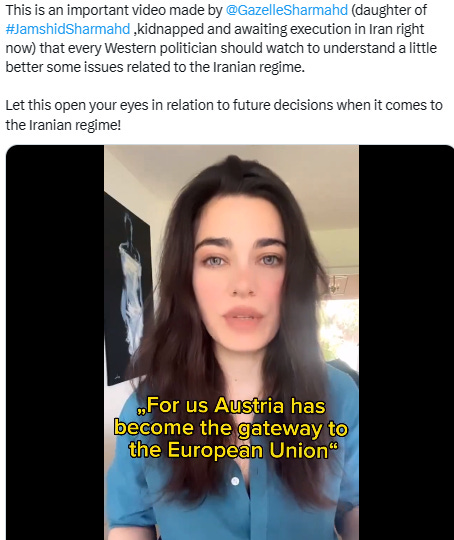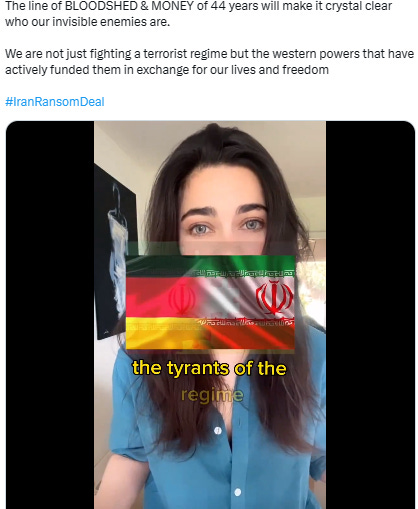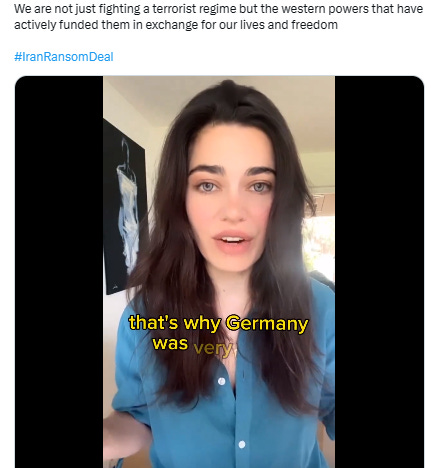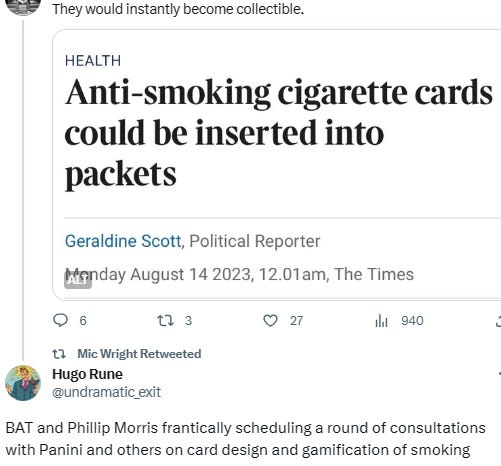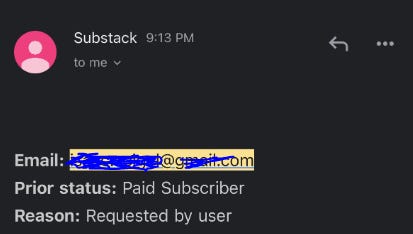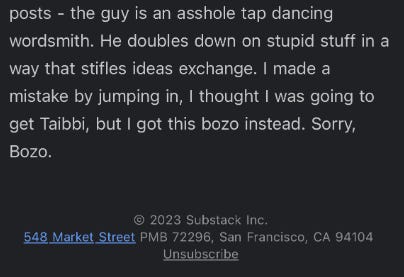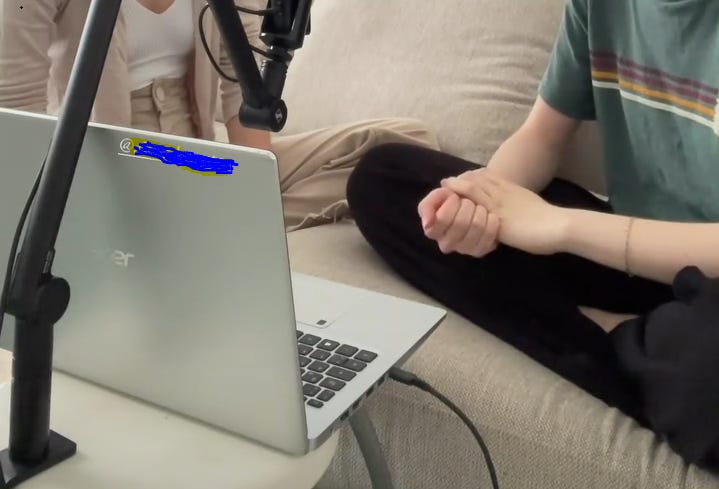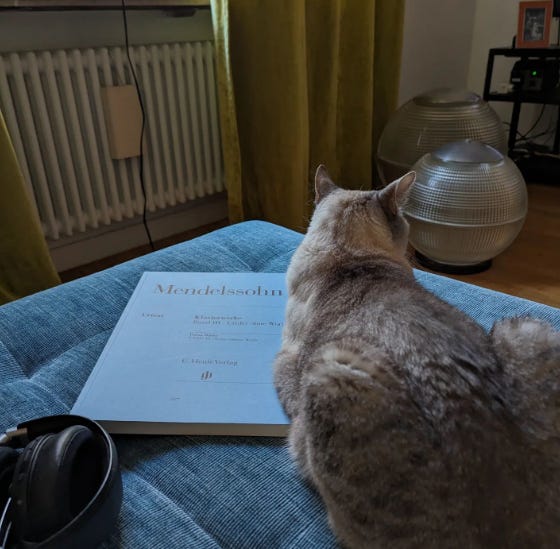Longform: Huge Ransom for Iran (from scandal of US Envoy for Iran Because Under Investigation by FBI, until Why U.S. Can't Release 8 and just 5 from Iran Prison)
Farsi/Persian, Deutsch, French, English. quad-language
Tehran 3.55pm / DC 7.25am / Paris and Berlin 2.25pm
The more U.S. & Western Allies seize, freeze assets from some countries and or dictators especially in the wake of Russia-Ukraine war, same enem(ies) try to jail U.S. citizens to get money. The release from prison of four or five Americans by Iran in return for the unfreezing of funds could “incentivise” Tehran to take more hostages. Twenty-six Republican senators have demanded an in-person briefing from Treasury Secretary Yellen and Secretary Blinken to answer questions about the recent prisoner-for-cash deal with Iran. Unlucky, after successful released US citizen from Evin prison, FBI investigates Biden Iran envoy over classified information.
The senators wrote a letter to Secretary of State Antony Blinken and Treasury Secretary Janet Yellen voicing their “significant concern” over the decision to release an estimated $6 billion in frozen Iranian assets.
US officials have defended the deal and said that the funds would only be used for humanitarian causes by Iran despite claims to the contrary by Iranian officials. The senators have questioned how the US will ensure that the Iranian regime will not use the released funds to support terrorist networks and weapons proliferation.
“While we firmly believe the United States must use every appropriate resource to secure the release of American citizens wrongfully detained overseas, this decision will reinforce an incredibly dangerous precedent and enable the Iranian regime to increase its destabilizing activities across the Middle East,” the letter read.
The Obama administration cut a similar deal with Iran when it released $400 million in liquidated assets to Iran in 2016 in return for Americans detained by Iran.
“Seven years later, the current administration is providing a ransom payment worth at least fifteen times that amount to the world’s largest state sponsor of terror, in yet another violation of the United States’ long-standing ‘no concessions’ policy,” the senators wrote.
They also warned that this would only encourage additional hostage-taking in return for financial or political gain.
The Iran Nuclear Agreement Review Act of 2015 (INARA) forces mandates the president to transmit any agreement with Iran related to its nuclear program to Congress for review.
Less than 24 hours after Washington and Tehran confirmed the prisoner-for-cash deal, reports suggested that Iran had slowed how fast it was accumulating near weapons-grade enriched uranium and had diluted some of its stockpiles. Blinken said he could not confirm those reports.
On Friday, the Republican senators said they feared the recent deal was an attempt to “sidestep” Congress and pursue alternative paths to financially compensate Iran “in an attempt to renegotiate a successor to the ill-fated 2015 nuclear deal.”
The Biden administration had prioritized reviving the now-defunct nuclear deal reached in 2015 under the Obama administration. But talks stalled last year after Iran reneged on commitments it had made as part of the new deal.
The deal in which South Korea unfroze $6 billion of Iranian funds amounted to the paying of a “ransom” and called for action to “resolutely” deal with Iran’s hostage diplomacy. The Australian-British academic was held in Iran's notorious Evin prison on trumped-up espionage charges and was sentenced to 10 years.
She was detained for a total of 804 days and spent months in solitary confinement before she was returned to her homeland in a prisoner swap in November 2020.
“In my view, the transfer of Iran's frozen assets in South Korea does amount to the payment of ransom,” she said.
“And we should be concerned about the prospect that such a payment will only incentivise Iran's hostage diplomacy further, which will endanger the lives of even more foreign and dual nationals visiting Iran, as well as provide the regime with more funds to further its crackdown on human and women's rights inside the country.”
Authorities in Tehran released four Iranian-American prisoners from Evin prison and placed them under house arrest.
Those released were businessmen Siamak Namazi, 51, Emad Shargi, 58, and 67-year-old environmentalist Morad Tahbaz, who also has British citizenship.
The fourth American citizen's identity has not been made public while another, also an unnamed American had already been released.
The funds freed by South Korea will be held in an account of Qatar’s central bank and Iran will reportedly be given access to the funds for humanitarian purposes.
Nizar Zakka knows exactly what it’s like to be left behind in a U.S. hostage deal with Iran in which billions of dollars were exchanged.
In 2016, Zakka and his family believed he would be included in a hostage deal negotiated by the Obama administration in which the U.S. government provided $1.7 billion in assets to Tehran, including $400 million paid in cash and delivered to the Iranian government by a U.S. military plane.
The agreement was timed to ensure the release of four U.S. hostages as the nuclear agreement between the U.S. and Iran and four other world powers was set to take effect.
Among those freed was Jason Rezaion, a Washington Post reporter whom an Iranian court convicted on bogus spying charges in 2015. Washington journalists, who had launched a vocal campaign to pressure the Obama White House for Rezaion’s safe return, celebrated their colleague’s freedom. But Republican lawmakers and other critics blamed Obama for giving Tehran and other countries incentive for more hostage-taking, and some human rights advocates faulted the deal for failing to bring all Americans held in Iran home.
Now those same critics argue it’s “déjà vu all over again” with the latest hostage deal involving nearly three times the amount of unfrozen assets the U.S. government agreed to release seven years ago in the last prisoner swap with Iran.
Five Americans are being freed from detention in Iran in exchange for the U.S. agreeing to unfreeze $6 billion in Iranian funds in South Korea and elsewhere, and the release of several jailed Iranians.
Zakka, then a Lebanese citizen and permanent legal resident of the United States, and his family were crestfallen. Three more years passed before Zakka was eventually released in a deal spearheaded by the Lebanese government.
Zakka’s case stands out because he wasn’t just on an undisclosed business trip or visiting relatives when he was arrested and jailed in Iran. Instead, Zakka had lived in the United States since age 16, went to college in the U.S., and became an Internet freedom advocate with his own nonprofit advocacy organization. He was invited by the Iranian government to speak at a government-sponsored technology conference in Tehran in the fall of 2015 when he was arrested in Tehran on his way to the airport to return to the U.S.
And in the initial months after his detention, amid final negotiations of the Iranian deal, the Obama administration initially would not publicly acknowledge Zakka’s arrest and imprisonment even though they were well aware of it.
At the time, Siamak Namazi, an Iranian-American businessman, and his father, Baquer Namazi, an 81-year-old former United Nations official who served as governor of an Iranian province under the U.S.-backed shah, were also left behind. At the time, some human rights advocates speculated that the Obama administration was trying to preserve its Iran nuclear deal and were worried that publicly acknowledging the arrests of Zakka and the Namazis could jeopardize it. President Trump withdrew from the nuclear deal and reimposed sanctions five months into his presidency.
Now Siamak Namazi, as well as Emad Sharghi and Morad Thabaz, who had all been jailed on unsubstantiated charges of spying, as well as two others whose families are withholding their names, are set to be released. Baquer Namazi, 86, was released last year.
Zakka is a passionate advocate for Shahab Dalili, 60, an American hostage excluded from the current hostage deal. They shared a cell at Evin prison, along with Xiyue Wang, another American hostage detained for several years before Iran released him in 2019. The trio of Americans – Zakka, Wang, and Dalili – formed a tight bond, helping each other survive the harsh conditions and numerous mental and physical forms of torture handed down by their Iranian guards in Evin prison. After returning to the United States, Zakka founded Hostage Aid Worldwide to help free other wrongfully detained Americans.
Dalili, an Iranian shipping captain who immigrated to the United States after retiring, has been left out of the hostage deal the Biden administration released and announced on Aug. 10. Jamshid Sharmahd, a German journalist and software engineer who lived legally and paid taxes in the U.S. for more than 20 years, also is not part of the hostage deal. Sharmahd was nabbed by Iranian authorities while he was visiting Dubai there years ago.
Jason Poblete, a lawyer for both the Dalili and Sharmahd families, says the Iranian regime tried to assassinate Jamshid Sharmahd in California in 2009, and the FBI helped foil the plot.
Their exclusion from the hostage deal is heartbreaking to the Dalili and Sharmahd families, who have been pleading with the U.S. government to help secure their loved ones’ release for several years.
“It’s too much money – it’s a shame to release all this money and not to include Shahab,” Zakka said in an interview while sitting outside the State Department to protest the agency’s failure to include Dalili in the deal. “He spent a year and a half with me in the same cell.”
Zakka says he no longer recognizes the United States, where he grew up and learned about what it’s like to live in a democracy where human lives are deeply valued and the government makes every effort to ensure that no one is left behind in enemy territory.
“He has to get out – it’s so unfair,” Zakka added. “[The State Department] forgot about American values – that you don’t leave anyone behind. They are just playing games now.”
Xiyue Wang, a naturalized U.S. citizen and graduate student at Princeton University who spent three years at Evin prison, is also pushing strongly for the State Department to demand Dalili’s inclusion in the current deal. (As a first step in the agreement, Iran last week allowed four detained U.S. citizens to move into house arrest from Evin prison while a fifth American was already under home confinement.)
Since the State Department announced the hostage deal, Wang has been angrily tweeting that Secretary of State Antony Blinken is caving to Iranian pressure not to include Dalili in any deal.
Dr Moore-Gilbert said the deal was the third “major cash-for-hostages deal Western countries have agreed upon with Iran, and by far the most lucrative, with the Americans transferring more than $1 billion per hostage”.
While welcoming the restrictions on Iran’s access to the funds, she said “it remains to be seen how Qatar will be able to ensure that funds aren't siphoned off to boost the IRGC's budget or finance various Iranian proxy groups abroad”.
Dr Moore-Gilbert, a former lecturer in Islamic studies, was arrested in September 2018 and accused of spying as she tried to leave Iran.
She was fulfilling an invitation from an Iranian university to join a seminar on Shiite Islam and carry out three weeks of research.
US special envoys for Iran have indicated they have a role in agreements related to US hostages in Iran. However, the Special Presidential Envoy for Hostage Affairs (SPEHA), the Hostage Recovery Fusion Cell (HRFC), and the Hostage Response Group (HRG) generally handle hostage cases for US nationals and establish US policy on the matter. Their roles—and some of the tools at their disposal—were codified under the Robert Alan Levinson Hostage Recovery and Hostage-Taking Accountability Act (“the Levinson Act”).
Robert Alan “Bob” Levinson (March 10, 1948 – presumed death before March 25, 2020) was a retired Federal Bureau of Intelligence (FBI) agent who was abducted in 2007, presumably by the IRI, after traveling to Iran’s Kish Island in the Persian Gulf for business. A US court found that “Iran’s kidnapping of Levinson qualifies as a hostage-taking,” with “the likelihood that Iran tortured him [at] ‘almost one hundred percent.’”
The UN’s Working Group on Arbitrary Detention likewise found that he had been arbitrarily detained and that it was “clearly impossible to invoke any legal basis justifying the deprivation of [his] liberty.” In March 2020, Levinson’s family announced that they received information indicating that he died in Iranian custody. In large part due to his family’s advocacy, the Levinson Act was signed into law in December 2020.
In 2015, President Barack Obama called for a review of the US policy on hostage-taking. Based on this review, he published Executive Order 13698 (EO 13698) and Presidential Policy Directive 30 (PPD-30).
PPD-30 laid out the US approach to hostage-taking. EO 13698 also established the SPEHA, HRFC, and HRG. These were tasked with coordinating to better secure the release of hostages, support hostages’ families, secure criminal prosecutions of hostage-takers, and otherwise promote US national and security interests.
The HRFC was created within the FBI to coordinate with agencies to “secure the safe recovery” of US nationals held hostage abroad and to coordinate the US response to other hostage-takings where the US has a “national interest.”
The HRG was to be convened as necessary to help secure the release of “US nationals held abroad” and was tasked with identifying hostage recovery options and strategies and coordinating the development and implementation of policies, strategies, and procedures related to hostage recovery.
The SPEHA was tasked with leading diplomatic engagement on US hostage policy and coordinating “diplomatic engagements and strategy in support of hostage recovery efforts.”
The Levinson Act was then introduced to establish a framework for determining what cases fall under the “unlawfully or wrongfully detained” (i.e., hostage) umbrella, as well as to codify the establishment of the SPEHA, HRFC, and HRG, and create the possibility of targeted sanctions for perpetrators of hostage-taking.
First, the Levinson Act lays out the criteria for which the secretary of state can determine whether nationals detained abroad are detained “unlawfully or wrongfully” by either a “foreign government or a non-governmental actor” based on “credible information.” This determination is crucial because the secretary of state can then “transfer responsibility for such case” from the Bureau of Consular Affairs to the SPEHA—if the “totality of the circumstances” indicates that a person has been detained unlawfully or wrongfully—ensuring the case receives the expertise and resources required.
Second, the act requires the secretary of state to provide an annual report to Congress on US nationals determined to be unlawfully or wrongfully detained. Additionally, the secretary of state must also supply “resources guidance in writing for government officials and families of unjustly or wrongfully detained individuals.”
Third, it codifies the establishment of the SPEHA, HRFC, and HRG. These largely mirror EO 13698, but slight changes exist, especially in further defining responsibilities to support hostages’ families.
Finally, the act provides that the president “may” impose targeted sanctions “on those responsible for or complicit in…the hostage-taking…or the unlawful or wrongful detention” of a US national abroad. President Joseph Biden implemented this provision, with minor changes, in Executive Order 14078 (EO 14078) in July 2022.
Since 2020, families of hostages have reported that they have “increasingly benefitted from the US government’s 2015 policy reforms,” with “the Levinson Act… viewed as a substantial move in the right direction,” especially around improved prioritization of wrongful detention cases. The US has publicly indicated that the SPEHA was involved in the release of Brittney Griner and Trevor Reed from Russia, seven hostages in Venezuela, and Paul Rusesabagina from Rwanda. It also released its first and so far only sanctions designation under EO 13078 in April, designating the Islamic Revolutionary Guard Corps Intelligence Organization (IRGC-IO), four IRGC-IO officials, and Russia’s Federal Security Service.
Despite these successes, former hostages and their families have also highlighted certain critiques. These include calls to use the term “hostage” instead of “wrongfully detained” individuals and concerns about the disorganization of the US system.
Despite the US’s efforts, the five released hostages are not the only US nationals held overseas, nor are they the only hostages in Iran. The James Foley Foundation lists fifty-nine publicly disclosed American hostage and wrongful detention cases. Hostage Aid Worldwide identified at least twenty hostages in Iran besides the five due to be released in last week’s deal. Between 2010 and 2022, the IRI detained sixty-six foreign and dual nationals, with forty arrested during the anti-establishment protests that followed Mahsa Jina Amini’s death in September 2022.
In fact, the IRI is holding at least three other hostages who may be considered nationals under the Levinson Act: Shahab Dalili, who holds a Green Card, Afshin Sheikholeslami Vatani, a US permanent resident, and Jamshid Sharmahd, a US resident. The Levinson Act defines “United States national” as a US national as defined in 8 US Code § 1101(a)(22) and 8 US Code § 1408, or as “a lawful permanent resident alien with significant ties to the United States.” The US State Department has also confirmed this definition applies to non-US citizens.
Dalili and Vatani are therefore nationals under the act. Dalili’s lawyer, Jason Poblete, has made clear that Dalili also meets the criteria of a “wrongfully detained” person under the act despite the State Department’s failure to classify him as such. In Sharmahd’s case, Poblete has highlighted the US’s “duty” to secure his release, but the US has said it views it as a matter for Germany, as he is a German citizen. Regardless, Sharmahd’s case is especially dire, as he has been sentenced to execution. Inaction in the Sharmahd matter would set a concerning precedent for dissidents everywhere, since he was abducted from the United Arab Emirates and renditioned to Iran due to his exercise of protected political speech.
The Levinson Act provides the government with critical processes and resources. These not only ensure that hostages are returned home but also shape US policies around hostage-taking, support the loved ones of those taken hostage, and promote accountability. However, these tools are limited and imperfect and, unfortunately, much of the information on government decision-making is necessarily confidential.
As the use of state-sponsored hostage-taking by authoritarian states continues to increase, the US government—especially the SPEHA, HFRC, and HRG, but also the president and legislators—must protect current hostages and prevent the taking of others by using the avenues provided under the Levinson Act and by evaluating and revising their methods.
Unlucky, US Envoy for Iran hit a scandal. A top Biden administration diplomat reportedly under investigation on suspicion of mishandling classified information has been hired to teach foreign policy classes at Princeton University, the New Jersey school announced this week.
Princeton’s hiring of Robert Malley, the administration’s chief Iran envoy, outraged Republicans who say they are still largely in the dark about why Mr. Malley’s security clearance was suspended earlier this year. The longtime Democratic diplomat was a key architect of the Obama administration’s 2015 nuclear deal with Iran and was leading President Biden’s effort to revive that pact.
His sudden disappearance from the foreign policy scene in Washington this spring left a host of unanswered questions. Some prominent Republicans publicly wondered whether Mr. Malley committed treason by sharing sensitive information with Iran or another foreign adversary.
With the administration’s broader Iran policy in flux, Princeton and Mr. Malley issued a press release Tuesday to make their joint announcement.
“While I am on leave from the State Department, I am extremely grateful for the opportunity to work with the next generation of public servants at the School of Public and International Affairs at Princeton University,” Mr. Malley said. “I look forward to my time at Princeton and returning to government service in due course.”
In addition to the foreign policy class this fall, Mr. Malley will teach courses in the spring on “some combination of diplomacy, negotiation, and foreign policy,” Princeton said.
“Rob Malley’s significant diplomatic experience and interactions with multiple presidential administrations will be of enormous value to our students,” Amaney Jamal, dean of Princeton’s School of Public and International Affairs, said in a statement. “I am very happy to welcome him to the school and look forward to his contributions.”
Republicans reacted with anger and bewilderment. Sen. Ted Cruz, Texas Republican and a Princeton alumnus, said he and other lawmakers don’t know the details of the Malley investigation.
“Pitiful. Look who my alma mater just made a prof,” Mr. Cruz said in a post on X, formerly known as Twitter. “Rob Malley was such a pro-Iran radical that he was FIRED from Biden [administration] & had his security clearance stripped for ‘mishandling classified docs’ (the details are still hidden).”
Indeed, congressional sources told The Washington Times late last month that the State Department has given few answers about Mr. Malley and the circumstances around his suspension, even in closed-door classified briefings.
Asked Wednesday whether Mr. Malley’s teaching job meant a change in his status as envoy, State Department deputy spokesman Vedant Patel told reporters only that “Mr. Malley remains on leave, and I don’t have any other updates on the situation.”
Sources familiar with the matter have said Mr. Malley had his security clearance suspended on April 22, though he continued giving public interviews about Iran policy through at least late May. Since Mr. Malley’s departure, the State Department’s deputy special envoy for Iran, Abram Paley, has been handling the administration’s Iran policy, administration officials said.
Mr. Malley helped craft the Obama-era Joint Comprehensive Plan of Action, which put limits on Iran’s nuclear program in exchange for the lifting of some economic sanctions. President Trump pulled the U.S. out of that deal in 2018.
========
Plus les États-Unis et les alliés occidentaux saisissent, gèlent les avoirs de certains pays et/ou dictateurs, en particulier à la suite de la guerre russo-ukrainienne, les mêmes gouvernements tentent d’emprisonner des citoyens américains pour obtenir de l’argent. La libération de prison de quatre ou cinq Américains par l’Iran en échange du dégel des fonds pourrait « inciter » Téhéran à prendre plus d’otages.
En Iran, les chercheurs occidentaux redeviennent une monnaie d'échange. Je peux analyser des phénomènes mais je n'ai aucun moyen de démontrer quelque chose. On donne des impressions. Les sujets parfois peu favorables au régime évoqués pendant leurs recherches servent de prétexte pour les accuser d'espionnage.
En Iran, les chercheurs en sciences sociales sont de nouveau la cible d'arrestations arbitraires. Les sujets parfois peu favorables au régime évoqués pendant leurs recherches servent de prétexte pour les accuser d'espionnage. Devenus des otages en puissance, beaucoup s'interrogent sur la pertinence de continuer à analyser le pays.
Kylie Moore-Gilbert a pris l’habitude inconsciente de repérer chaque emplacement de caméra vidéosurveillance à chacun de ses déplacements. Un tic qu’elle dit avoir développé après ses 804 jours d’incarcération en Iran. L’universitaire et politologue anglo-australienne s’était rendue à Qom, au sud de Téhéran, en 2018, invitée par l'université locale des religions et confessions pour assister à un séminaire sur l'islam chiite. Le jour de son vol retour, en septembre de la même année, elle est arrêtée à l'aéroport de Téhéran. Elle est incarcérée et mise à l'isolement dans la prison d'Evin, connue pour l'embastillement des prisonniers politiques. Au sein de l'aile 2A, elle est placée à l’isolement et interrogée des centaines d’heures par les gardiens de la Révolution, organisation paramilitaire iranienne chargée de toutes les plus basses besognes du régime.
En juillet 2019, Kylie Moore-Gilbert est condamnée à dix ans de prison dans un simulacre de procès pour « espionnage » par Abolqasem Salavati, surnommé « the hanging judge » (« le juge des pendaisons ») en raison de son goût pour la peine de mort. Détenue à l'isolement, la chercheuse fait de nombreux allers-retours à l’hôpital et à l’infirmerie et suit un traitement psychiatrique pour tenir.
Son arrestation n’est rendue publique qu’un an après et sa libération n'interviendra qu'en novembre 2020. « L’objet de mes recherches n’était pas l’Iran, mais le Bahreïn. Je ne pensais pas que le régime iranien s'y intéresserait particulièrement », affirme-t-elle à Marianne. La chercheuse se croyait donc à l’abri. Sa thèse sur le mouvement de révolte chiite à Bahreïn pendant le printemps arabe ne la rangeait pourtant pas parmi les chercheurs en sciences sociales hostiles au pays.
========
Je mehr die USA und die westlichen Verbündeten Vermögenswerte einiger Länder und/oder Diktatoren beschlagnahmen, einfrieren, insbesondere im Zuge des Russland-Ukraine-Krieges, desto mehr versuchen dieselben Einläufe, US-Bürger ins Gefängnis zu stecken, um Geld zu bekommen. Die Freilassung von vier oder fünf Amerikanern aus dem Gefängnis durch den Iran im Gegenzug für die Freigabe von Geldern könnte Teheran "anregen", weitere Geiseln zu nehmen
Die Freilassung von vier Amerikanern aus dem Gefängnis durch den Iran als Gegenleistung für die Freigabe von Geldern könnte Teheran einen Anreiz geben, weitere Geiseln zu Nehme. Das Regime in Iran nimmt seit Jahrzehnten Unschuldige fest, um verurteilte Terroristen freizupressen. Darauf muss endlich eine starke Antwort folgen.
Ihre Familien dürfen aufatmen. Fünf iranischstämmige US-Amerikaner, die aufgrund unbegründeter Vorwürfe seit Jahren in Iran festgehalten werden, könnten bald freigelassen werden. Erzielten die USA und Iran eine entsprechende Vereinbarung.
Doch was für die Geiseln und ihre Angehörigen eine gute Nachricht ist, ist in Wahrheit ein diplomatischer Triumph Teherans. Laut Medienberichten bekommt Iran im Gegenzug mehrere iranische Gefangene – und darüber hinaus die Freigabe eines iranischen Vermögens von 6 Milliarden Dollar, das im Zuge der US-Sanktionen eingefroren wurde.
Dieser Gefangenenaustausch mit den USA ist für die Mullahs nur das neueste Kapitel einer unfassbar erfolgreichen Geiseldiplomatie. Seit den 1980er Jahren lässt Iran regelmäßig unschuldige westliche Staatsangehörige festnehmen, um damit die Freilassung iranischer Terroristen und Agenten zu erpressen.
Erst Ende Mai kam Olivier Vandecasteele, ein belgischer humanitärer Helfer, frei, der zu 40 Jahren Haft und 74 Peitschenhieben verurteilt worden war. Im Gegenzug bekam Iran den verurteilten Terroristen Assadollah Assadi, der in Frankreich einen Anschlag auf iranische Oppositionelle geplant hatte.
Es ist verständlich, dass man kurzfristig auf die Erpressungen eingeht, um das Leben eigener Staatsbürger zu retten. Aber nach mehr als 30 Jahren ist es Zeit, dass der Westen eine klare Antwort auf Irans plumpe Geiseldiplomatie findet. Bisher folgten darauf weder Sanktionen noch sonstige Vergeltungsaktionen. Das ist ein verheerendes Signal der Schwäche, der Erpressbarkeit.
Mindestens genauso bedenklich: Geiseln mit europäischer Staatsbürgerschaft dürfen nicht auf denselben Einsatz hoffen, wenn sie iranischer Abstammung sind. Während Belgiens Premierminister sich persönlich für die Freilassung von Vandecasteele einsetzte, droht dem deutschen Staatsbürger Jamshid Sharmahd in Iran derzeit die Todesstrafe. Bislang kam aus dem Bundeskanzleramt kein einziger öffentlicher Versuch, seine Freilassung zu erwirken.
Neun iranische Belutschen und zwei Belutschen mit afghanischer Staatsangehörigkeit seien zwischen Sonntagmorgen und Dienstagmorgen gehängt worden, teilte die in Norwegen ansässige Menschenrechtsorganisation Iran Human Rights (IHR) am Mittwoch mit.
Der 30-jährige Mohammad Arbab und der 32-jährige Asadollah Amini, zwei Belutschen mit afghanischer Staatsangehörigkeit, wurden demnach am Sonntag und Montag heimlich in einem Gefängnis in Sistan-Balutschistan ebenfalls durch Erhängen hingerichtet.
Nach IHR-Angaben wurden seit Anfang des Jahres bereits 423 Menschen hingerichtet, allein 61 Todesurteile seien im Juli vollstreckt worden. Dabei habe ein Drittel der Hinrichtungen Mitglieder der belutschischen Minderheit getroffen – während Belutschen nur zwischen zwei und sechs Prozent der iranischen Bevölkerung ausmachen. Die Belutschen sind zumeist sunnitische Muslime und nicht Schiiten wie die Mehrheit im Iran, viele von ihnen fühlen sich diskriminiert.
Die Aktivisten von IHR werfen Iran vor, die Anwendung der Todesstrafe massiv ausgeweitet zu haben und sie nach den Protesten wegen den Tods der 22-jährigen Kurdin Mahsa Amini im vergangenen Jahr gezielt als Einschüchterungsinstrument einzusetzen.
=========
هر چه بیشتر متحدان امریکا و غرب دارایی های برخی کشورها و یا دیکتاتورها را به ویژه در پی جنگ روسیه و اوکراین توقیف و مسدود کنند، همان افراد سعی می کنند شهروندان امریکایی را برای به دست اوردن پول زندانی کنند. ازادی چهار یا پنج امریکایی از زندان توسط ایران در ازای ازاد کردن منابع مالی میتواند تهران را به گروگانگیری بیشتر تشویق» کند.
درحالی دولت «ابراهیم رئیسی» بارها از وجود ۷ میلیارد دلار دارایی مسدود شده حاصل از فروش نفت در کره جنوبی میگفت، در جریان تبادل زندانی میان ایران و آمریکا اعلام شده ۶ میلیارد از این دارایی بهصورت غیرمستقیم در دسترس قرار میگیرد تا ایران بتواند با آن کالای بشردوستانه خریداری کند. حال سوال اینجاست که ۱ میلیارد دلار دیگر چه شده است؟
آنقدر خبر آزادسازی داراییهای بلوکه شده ایران نزد بانکهای کرهجنوبی تکرار شده بود که این بار هم وقتی زمزمههای آزادسازی بالاگرفت، اولین مواجهه با خبر، شوخی و طعنه و کنایههای همیشگی بود. اما این بار اصل خبر واقعیت دارد، قرار است پولهای ایران در کرهجنوبی دستکم از این حسابها آزاد شوند.
با این حال، همچنان بر سر نحوه استفاده از این داراییها بسته به اینکه چه کسی راوی خبر باشد، تفاوتهایی وجود دارد. راویان آمریکایی ماجرا همچون «جان کربی»، هماهنگ کننده ارتباطات راهبردی شورای امنیت ملی کاخ سفید، روز جمعه از محدودیتهایی برای دسترسی ایران به پولهای آزاد شده و نظارت بر نحوه استفاده آنها سخن گفت.
به گفته این مقام کاخ سفید، این منابع مالی فقط برای غذا، دارو و تجهیزات پزشکی قابل دسترسی است که کاربرد نظامی دوگانه ندارند و در یک فرآیند دقیق و تحتنظر وزارت خزانهداری ایالات متحده، هزینه خواهند شد.
هفت، هشت یا شش میلیارد دلار؟
اما آنچه بیش از اختلاف بر سر فرآیند نحوه دسترسی ایران به این داراییها مورد توجه قرار گرفته است، اعلام ارزش این داراییهاست که ناگهان از ۷ میلیارد دلار قبلی، به ۶ میلیارد دلار کاهش یافته است.
البته مرور سابقه خبرهای داراییهای بلوکهشده ایران در کرهجنوبی نشان میدهد که زمانی صحبت بر سر ۸.۵ میلیارد دلار دارایی بود. «علی ربیعی»، سخنگو دولت «حسن روحانی» در تیر سال ۱۳۹۹، ضمن گلایه از رفتار دولت کرهجنوبی، میزان بدهی نفتی کرهجنوبی به ایران را ۸ میلیارد دلار اعلام کرده بود.
یک ماه بعد از آن، «حسین تنهایی»، رییس اتاق ایران و کره جنوبی در مرداد همان سال، با اشاره به اینکه شکایت رسمی ایران از کرهجنوبی کلید خورده است گفته بود: «کرهجنوبی ۸.۵ میلیارد دلار را پس نمیدهد.»
پساز آن هرچه خبر و گزارش درباره داراییهای بلوکه شده ایران منتشر شده، عدد این مطالبات معادل ۷ میلیارد دلار برآورد شده است، ازجمله «عبدالناصر همتی»، رییسکل وقت بانک مرکزی در اسفند ۱۳۹۹ گفته بود: «پولی که بانک مرکزی از کره جنوبی طلب دارد ۷ میلیارد دلار است، اما قرار شده که پرداختها حداقل با یک میلیارد دلار آغاز شود.»
پاسخ قطعی و روشنی برای این پرسش که چطور ۷ میلیارد دلار بلوکه شده درست در زمان آزادسازی به ۶ میلیارد دلار کاهش یافت، وجود ندارد، اما میشود سناریوهایی را درباره آن محتمل و ممکن دانست.
نفت در برابر واکسن و آمبولانس
یکی از این گمانهها، هزینه شدن موردی مبالغی از منابع بلوکهشده طی سالهای گذشته است، کما اینکه در اظهارات آقای همتی، رییسکل بانک مرکزی در دولت روحانی، صحبت از پرداخت یک میلیارد دلار از منابع بلوکهشده به میان آمده است.، هرچند اطلاعی از اینکه آیا این اتفاق رخ داده یا خیر، در دست نیست.
همتی همچنین در دی ۱۳۹۹، از ابراز تمایل کرهایها برای تحویل آمبولانس و دستگاه تست کرونا بهجای پول ایران خبر داده بود.
البته او خود در ادامه تصریح کرده بود که «منابع بلوکه شده ایران در کره جنوبی با ۲۰ یا ۵۰ میلیون دلار حل نمیشود و کره باید ۷ میلیارد دلار ایران را همراه با سود این پول برگرداند، چراکه هماکنون کره در حال استفاده از منابع ایران است.»
البته «اسحاق جهانگیری»، معاون اول حسن روحانی، چند ماه قبل از این اظهارات همتی با انتقاد از دولت کره جنوبی طوری صحبت کرده بود که گویی دولت کره جنوبی، حتی اجازه استفاده از ۷ میلیارد دلار منابع ایران برای واردات واکسن تولیدی کره را هم به ایران نداده بود.
در اردبیهشت ۱۴۰۰ نیز «حسین تنهایی»، رییس اتاق مشترک ایران و کرهجنوبی به خبرگزاری «تسنیم» از پرداخت ۳۰ میلیون دلار از پولهای بلوکهشده ایران در کرهجنوبی برای خرید واکسن کرونا خبر داد.
اگرچه در نهایت عدد و رقم روشنی از استفاده موردی ایران از منابع بلوکه شده در کره در دست نداریم، اما حتی اگر این موارد هم اتفاق افتاده باشد، بعید است رقمی نزدیک به یک میلیارد دلار باشد.
گزینه دیگری که برای توجیه کاهش یک میلیارد دلاری منابع ایران در کره میتوان متصور بود، تغییر ارزش برابری ارز کرهجنوبی، وون در برابر آمریکاست.
ایران نفت و فرآوردههای نفتی خود را در زمان فروش به دلار قیمتگذاری و فروخته بود، اما مبالغ حاصل از فروش نفت و فرآوردهها بهدلیل تحریمهای اولیه آمریکا و محرومیت ایران از دسترسی به دلار در بانکهای کرهجنوبی، به وون کره نگهداری میشدند.
اگر آغاز بلوکه شدن داراییهای ایران در بانکهای کره را سال ۱۳۹۷ همزمان با خروج دولت «دونالد ترامپ» از توافق برجام درنظر بگیریم، در این دوره زمانی حدودا پنج ساله، ارزش وون کرهجنوبی در برابر دلار آمریکا کمتر از ۱۵ درصد کاهش داشته است.
معادل دلاری مطالبات ایران از کره که پیشازاین ۷ میلیارد دلار اعلام میشد، با این کاهش ۱۴.۶ درصدی ارزش وون به دلار، بیش از یک میلیارد دلار کاهش یافته است.
اگر بازه زمانی دو ساله اخیر را با تاخیر دولت سیزدهم و مخالفت اصولگرایان با برجام و به بنبست کشاندن شیوه دولت قبل در بازپسگیری این داراییها مرتبط بدانیم، میزان کاهش ارزش وون به دلار در دو سال گذشته نزدیک به ۱۲.۶ درصد بوده است که در ابعاد ۷ میلیارد دلار، به معنای افت ارزشی به میزان ۸۸۲ میلیون دلار است.
در عین حال، بارها حتی مقامهای رسمی از کارمزد ماهانه نگهداری این مبالغ نزد بانکهای کرهای نیز گلایه کردهاند که اگر آن را بهعنوان هزینههای عملیاتی به این رقم از دست رفته از بابت کاهش ارزش برابری اضافهکنیم، زیان عدم دسترسی به این پولها بیشتر نیز خواهد شد.
اما حتی این حسابوکتابها و یافتن ردپای یک میلیارد دلار دود شده، پایان زیانکاریهای سریالی اقتصاد ایران نیست، آنطور که گفته شده، این پولها راهی دراز و پیچ در پیچ را باید بپیمایند تا به حسابهای بانکهای قطری برسند.
تبدیل وون به یورو و انتقال معادل یورویی این مبالغ به بانکهایی در آلمان و سوئيس و سپس انتقال آنها به حسابهایی در قطر، در هر مرحله از تبدیل و انتقال، مستلزم پرداخت کارمزد، دستمزد و حقالعملهای بانکی است که در ابعاد میلیاردی، ارقامی قابلتوجه میشوند.
خطر از دست رفتن ارزش داراییها و ذخایر ارزی ایران که به ارزهای غیر معتبر جهانی نظیر روبل، یوان و دیگر ارزها نگهداری میشوند، آینده محتملی است که در مورد حسابهای بلوکهشده در کرهجنوبی تجربه شد.
جدال بر سر ۷ میلیارد دلار بلوکه شده ایران نزد بانکهای کرهجنوبی که حالا ۶ میلیارد دلار شده، در حالی به ایستگاههای پایانی نزدیک شده است که عدمالنفع ایران از بابت فروش نرفتن نفت و دیگر فرآوردهها یا محرومیت ایران از ابزارهای معمول و استاندارد انتقال منابع صادراتی، بسیار بیش از اینهاست.
تنها در یک مورد یعنی عدمالنفع فروش نرفتن روزانه یک میلیون بشکه نفت ایران در ۱۰ سال گذشته بهدلیل تحریمها، با احتساب متوسط قیمت ۶۶ دلار برای هر بشکه، به بیش از ۲۴۲ میلیارد دلار بالغ میشود.
عبدالناصر همتی، رییسکل سابق بانک مرکزی در توییتی این عدمالنفع را حدود ماهانه ۳ میلیارد دلار درنظرگرفته که برای ۱۰ سال، به رقم ۳۶۰ میلیارد دلار بالغ میشود.
تاسفبار آنجاست درحالیکه ۲ تا ۳ میلیارد دلار فقط از محل فروش نرفتن نفت به اقتصاد ایران تحمیل میشود، دسترسی به پولهای بلوکهشده پس از بیش از ۵ سال کشمکش که فقط قرار است صرف خرید کالاهای اساسی، دارو یا تجهیزات پزشکی شود، بهعنوان دستاورد دولت ابراهیم رئیسی به افکار عمومی ایرانیان فروخته میشود.
«آیا میدانستید…؟» عنوان سلسله گزارشهای جدید «ایرانوایر» است که برمبنای «داده» منتشر میشوند. در این گزارشها، دادههای خام از مراکز داده و بانکهای اطلاعات معتبر داخلی و خارجی جمعآوری، تجزیه و تحلیل، محاسبه و مقایسه میشوند و بهصورت ترکیبی از متن و دادهنگاری (اینفوگرافیک)، در اختیار مخاطب قرار میگیرند. هدف این گزارشها، ترسیم تصویری خوانا و روشن از پدیدهها و وقایعی است که پیرامون ما در جریان است.
علی خامنهای در سخنرانی روز اول فروردین ۱۳۹۱، در مشهد گفته بود:
«کشور آمریکا که امروز حدود سی و چند میلیارد بشکه نفت ذخیره دارد، طبق محاسباتی که کارشناسان کشورمان کردهاند، که آمارشان متکی به آمار خود آمریکاییهاست، نفتش تا سال ۲۰۲۱، یعنی تا ۹ سال دیگر تمام خواهد شد.»
حالا بیش از یک سال از موعد پیشبینی خامنهای گذشته است، اما دادهها نشان میدهد در این مدت نهتنها نفت آمریکا تمام نشده، بلکه میزان تولید آن در سال گذشته میلادی به ۲ برابر سال ۲۰۱۲، یعنی زمان پیشبینی خامنهای رسیده است.
بر عکس پیشبینی رهبر جمهوری اسلامی ایران، در این مدت تولید نفت ایران، بر اساس آمارهای منابع دست دوم اوپک به نسبت سال ۲۰۱۲ حدود ۱۵ درصد کاهش یافته است.
=========END————
Thank you, as always, for reading. If you have anything like a spark file, or master thought list (spark file sounds so much cooler), let me know how you use it in the comments below.
If you enjoyed this post, please share it.
______________
If a friend sent this to you, you could subscribe here 👇. All content is free, and paid subscriptions are voluntary.
——————————————————————————————————
-prada- Adi Mulia Pradana is a Helper. Former adviser (President Indonesia) Jokowi for mapping 2-times election. I used to get paid to catch all these blunders—now I do it for free. Trying to work out what's going on, what happens next. Arch enemies of the tobacco industry, (still) survive after getting doxed.
Now figure out, or, prevent catastrophic situations in the Indonesian administration from outside the government. After his mom was nearly killed by a syndicate, now I do it (catch all these blunders, especially blunders by an asshole syndicates) for free. Writer actually facing 12 years attack-simultaneously (physically terror, cyberattack terror) by his (ex) friend in IR UGM / HI UGM (all of them actually indebted to me, at least get a very cheap book). 2 times, my mom nearly got assassinated by my friend with “komplotan” / weird syndicate. Once assassin, forever is assassin, that I was facing in years. I push myself to be (keep) dovish, pacifist, and you can read my pacifist tone in every note I write. A framing that myself propagated for years.
(Very rare compliment and initiative pledge, and hopefully more readers more pledges to me. Thank you. Yes, even a lot of people associated me PRAVDA, not part of MIUCCIA PRADA. I’m literally asshole on debate, since in college). My note-live blog about Russia - Ukraine already click-read 4 millions.
=======
Thanks for reading Prada’s Newsletter. I was lured, inspired by someone writer, his post in LinkedIn months ago, “Currently after a routine daily writing newsletter in the last 10 years, my subscriber reaches 100,000. Maybe one of my subscribers is your boss.” After I get followed / subscribed by (literally) prominent AI and prominent Chief Product and Technology of mammoth global media (both: Sir, thank you so much), I try crafting more / better writing.
To get the ones who really appreciate your writing, and now prominent people appreciate my writing, priceless feeling. Prada ungated/no paywall every notes-but thank you for anyone open initiative pledge to me.
(Promoting to more engage in Substack) Seamless to listen to your favorite podcasts on Substack. You can buy a better headset to listen to a podcast here (GST DE352306207).
Listeners on Apple Podcasts, Spotify, Overcast, or Pocket Casts simultaneously. podcasting can transform more of a conversation. Invite listeners to weigh in on episodes directly with you and with each other through discussion threads. At Substack, the process is to build with writers. Podcasts are an amazing feature of the Substack. I wish it had a feature to read the words we have written down without us having to do the speaking. Thanks for reading Prada’s Newsletter.
Wants comfy jogging pants / jogginghose amid scorching summer or (one day) harsh winter like black jogginghose or khaki/beige jogginghose like this? click
Headset and Mic can buy in here, but not including this cat, laptop, and couch / sofa.




